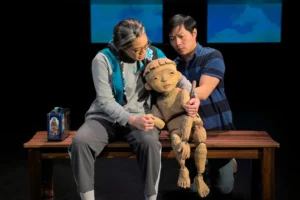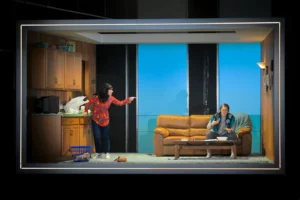Poor Yella Rednecks: Vietgone 2
Qui Nguyen
American Conservatory Theater

Qui Nguyen refuses to write a play that can be easily described by any conventional terms. His highly inventive, irreverent, wild ride of a love story, Vietgone, that pulled up in 2018 on a motorcycle onto the intimate Strand stage of A.C.T. was a topsy-turvy combination of romantic comedy; hip-hop concert; parody about immigrants’ views of America; and a sex-filled, expletive-packed action play that featured superhero stunts and kung fu. Vietgone is also Chapter One of a planned trilogy about the playwrights’ parents’ – the first installment telling of their separate immigrations in 1975 from a war-torn Vietnam, each to land and then to fall in love together in a refugee camp in Arkansas. Part Two of their story now opens once again on American Conservatory Theater’s Strand stage with Poor Yella Rednecks: Vietgone 2 employing the same, often crazy mixture of stark realism and wild fantasy to continue a son’s own love story to his immigrant parents. But this time we are told, “This is not a love story; it is a story about surviving love.”
Six years after landing in Arkansas, Qui Nguyen’s parents, Quang and Tong, are married and living only a few miles away from the refugee camp in a small town where they are only one of two Asian families. Life is tough as they barely scrape enough for daily essentials in their small apartment where they live with Tong’s mother, Huong, and a young Qui himself (represented as a wooden puppet and called Little Man) – none of whom have yet learned much English. As the man of the house, Quang has had less success than his wife holding a job consistently, while Tong is working long hours – often double shifts – at a local deli. But her job is going away since her boss is retiring; and she wants to use the $1000 she has so diligently been saving as a down payment to open their own business, “East Main Dairy Diner.” Quang emphatically says no for reasons she does not understand, nor does he dare tell her why. The two who once fell madly in love after his leaving behind in Vietnam a wife and two kids and her escaping the grips of a love-sick puppy of a boyfriend now suddenly look at the other with less sure eyes.
But this being Qui Nguyen, none of the above or all that is to follow is told in any manner approximating straight-forward. Jaime Castañeda returns as director once again to send this cast of five through multiple scenes that jump quickly and madly in and out of reality, with sequences of slow-motion action resembling cartoons and video games intermingled with stark snippets of day-to-day life in a small town where the majority sees the minority more like goons than fellow human beings. As in Vietgone, the narrative is often punctuated by Shammy Dee’s original, hip-hop tunes that pop up suddenly, often abruptly. The rapid fire of oft-difficult-to-understand lyrics do not always provide much additive value to the story itself, but their hard-beat inclusion definitely adds an intensity and electricity to the overall telling that is quite compelling and exciting.
As Quang, Hyunmin Rhee delivers through his moments of silence what is going on inside Quang’s head even more than through the lines the playwright has given him. The gnawing guilt of leaving behind two kids he will probably never see, the mounting frustration of not finding a way to earn the money his family needs, the building tension that is too-fast erasing the intimacy between him and his wife, the enticing draw of an exotic stranger’s flirts, and the tender love for a son who was born in the U.S. but is not at all yet assimilated – all are vividly conveyed in a face of penetrating eyes and deeply subtle, much nuanced expressions that speak louder than any of his words.

Nothing is subtle about what Tong is feeling or thinking at any given moment. Jenny Nguyen Nelson gives a powerhouse performance in the role of a young woman who exudes determination to forge her own route to survival and eventual success in this land still foreign in so many ways. At one point she explosively raps with vigor, “I’m not just pretty, my brain is damn big … While the rest are dreaming, I’m always scheming.” Tong is a take-charge, take-no-prisoners do-er who declares, “I’m done being lost; I’m too ready for direction.” If that means re-connecting with a long-lost boyfriend in order to satisfy her immediate needs or to drive one-hundred miles to work as a cutter in a bag factory in order to put food on the table for her son and mother, she does it. And woe be to the white rednecks in the grocery who dare to make a pass at her! Even when we meet her as a seventy-year-old as her son solicits her help in telling him her story, she is clear that her story is to be told “true and hard” – words that describe the approach Jenny Nguyen Nelson brings throughout in her stunning depiction of Qui’s mother, Tong.

As in Vietgone, each of the three other cast members play multiple parts, often switching from one role and one location of the stage to another in what seems like a split-second. Tong’s mother, Huong, is still the flirting, foul-mouthed, gruff persona she was six years prior, with few words kind ever spoken to a daughter that she actually loves with all her heart. Christine Jamlig reigns supreme in her primary role as a Huong totally pissed that she is here in America. She is a riot in all the many ways she shows just how she feels about the “Cheeseburgers” she is forced to live around. She has no interest in learning any English; but what she does have is sincere, loving devotion to her grandson – a lonely, young kid constantly bullied at school whom she counsels, “Being different means you have a chance to be magical.” Christine Jamlig completely changes look, age, and demeanor as she also raps in the spotlight as the gorgeous Thu (abandoned wife of Quang) and as she does all she can to seduce Quang in a bar as the flirtatious, desperately horny San.
Among other roles, Will Dao is Quang’s big-smiling best friend, Nhan, who tries to entice him to move to Texas where there is a large, thriving Vietnamese community. Besides roles as a ten-gallon-hat-wearing cowboy and an obnoxious hick of a grocery clerk about to get his ass kicked around by a kung-fu-skilled Tong, Will Dao excels especially as the voice and puppeteer of the wooden Little Man. Somehow, he is able to convey a host of clear emotions and reactions from a face carved solid and from head and limbs that move only as he directs them. Particularly moving is a scene of the young, all-wood Qui escaping his life of school-yard torment and classroom failures as he creates his own world of Storm Troopers and Spiderman.
If forced to choose the standout among this exceptionally strong cast, I would have to call out one of the current celebrated war horses of the Bay Area scene, Jomar Tagatac. No less than seven are the number of varied roles he masterfully, usually hilariously portrays, from a Masterpiece Theatre sounding British narrator to a rough-neck kid tormenting Little Man with his name-calling “Yeehaws” to the playwright himself trying to negotiate the ground rules under which Huong will let him tell her story for his play. But as the once, cry-baby boyfriend, Bobby, that Tong left behind in Vietnam and who shows up six years later in Arkansas, Jomar Tagatac strikes it big. Bobby now can speak more broken English than his disappearing Vietnamese and is rib-tickling as he speaks almost like a young kid (“Me make good money”). But when he has a much-sought-after romantic moment with the girl who left him behind, Jomar Tagatac’s Bobby is a fumbling, endearing fool of a would-be lover who draws loud guffaws from an adoring audience.

Tanya Orellana has designed a striking set that allows Yi Zhao’s ever-changing, neon-bright lighting to blaze in stripes and diagonals in the set’s layered crevices and that shows off well Yee Eun Nam’s projections both realistic and oft-dance-club-appropriate. Central to the set design is the elevated, boxed-in, sparsely adorned apartment where the family resides – a kind of protective haven where they can speak their native tongue without ridicule of those living outside it.
Language once again plays a major role in Qui Nguyen’s narrative. Upfront, the elderly Tong tells her playwright son, “I want all the white people to speak like I hear them,” and “I want to talk good.” As in Vietgone, the Vietnamese speak the native tongue to each other in full-commanded, perfectly pronounced English. The Americans they meet talk in gobbledygook of everyday clichés strung together in ways that make no sense (“Oh, egg roll, hook ‘em horns”). For someone like Booby who has learned some English, he speaks in the kind of broken, mixed-word phrases that sound like the ones that Vietnamese have often been scripted to say in American films and TV shows.
Whether or not one was lucky enough to see a former production of the popular Vietgone at A.C.T., San Jose’s City Lights Theatre Company, or the Oregon Shakespeare Company, there is much to enjoy and relish in the love/not-love story that Qui Nguyen provides in Poor Yella Rednecks: Vietgone 2. The hyper-energized, rap-populated, kung-fu, expletive-abounding style of telling works but also feels a bit repetitive of the original chapter. While I personally look forward to seeing what happens next in Quang, Tong, Huong, and Qui’s story as new Americans in the strange, southern land of Arkansas, I hope for perhaps some new, equally enticing ways the playwright will relate the third leg of his fascinating, informative trilogy.
Rating: 4 E
Poor Yella Rednecks: Vietgone 2 continues through May 7, 2023, in production by American Conservatory Theater at the Strand Theater, 1127 Market Street, San Francisco. Tickets are available online at www.act-sf.org , by calling the box office at 415-749-2228, or by emailing tickets@act-sf.org.
Photo Credits: Kevin Berne

Leave a Reply